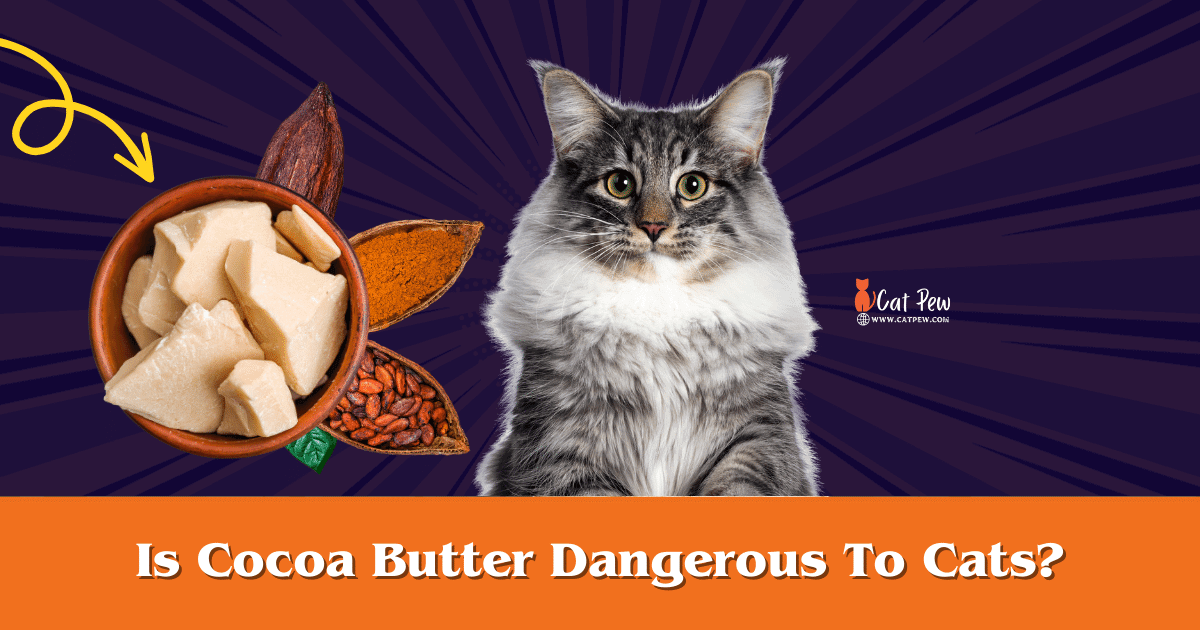Cocoa butter is dangerous to cats as it is toxic and contains Theobromine, which can cause poisoning in felines. It is important to avoid using cocoa butter on cats or allowing them to consume it.
Cats are known for their curiosity and tendency to explore their environment, including ingesting various substances they come into contact with. However, when it comes to cocoa butter, it is important to keep it out of their reach. Cocoa butter contains theobromine, a compound that is toxic to cats and dogs.
Even small amounts can lead to stomach upset, vomiting, diarrhea, and in severe cases, seizures or even death. It is important to be mindful of where cocoa butter is stored and to always keep it away from your feline friends. To ensure your cat’s safety, it is best to avoid using products containing cocoa butter and opt for cat-friendly alternatives instead.
The Basics Of Cocoa Butter
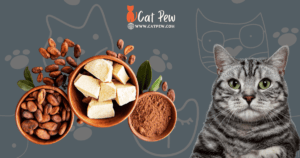
Before delving into whether cocoa butter is dangerous to cats, it’s essential to understand the basics of cocoa butter itself. This popular ingredient is widely recognized for its rich texture, distinct aroma, and versatile applications. Derived from the cocoa bean, cocoa butter is a natural fat that is commonly used in the production of various cosmetics, personal care products, and even edible goodies. Now, let’s dive deeper into what cocoa butter actually is, how it is produced, and how it is commonly used.
What Is Cocoa Butter?
Cocoa butter, also known as theobroma oil, is a vegetable fat that is extracted from cocoa beans. It is one of the key components of chocolate, giving it its smooth and silky texture. Cocoa butter has a mild chocolate scent and a pale yellow color when in its purest form.
How Is Cocoa Butter Produced?
The production of cocoa butter involves several steps to extract the fat from cocoa beans. Here’s a simplified breakdown of the process:
- Harvesting the cacao tree: Cocoa beans are obtained from the cacao tree, specifically from its large fruits called pods.
- Fermentation: The harvested cocoa beans are then fermented for some time, usually in wooden boxes or banana leaves. This fermentation process contributes to the development of cocoa’s complex flavors.
- Drying: After fermentation, the beans are spread out and left to dry naturally under the sun, allowing them to lose moisture and reduce their overall weight.
- Roasting: The dried cocoa beans undergo a roasting process to further enhance the flavor and aroma. This step helps to develop the characteristic chocolate taste.
- Grinding: Once roasted, the cocoa beans are ground into a thick paste called cocoa liquor or cocoa mass.
- Pressing: The cocoa liquor is then subjected to a hydraulic press, which separates the cocoa solids (known as cocoa powder) from the cocoa butter.
- Refining: Finally, the extracted cocoa butter undergoes further refining processes, such as filtering and deodorizing, to remove impurities and improve its quality.
Common Uses Of Cocoa Butter
Due to its unique properties, cocoa butter has extensive usage in numerous industries. Here are some common applications of cocoa butter:
| Industry | Uses |
|---|---|
| Food industry |
|
| Cosmetics |
|
| Pharmaceuticals |
|
Cocoa butter’s emollient properties make it an excellent choice for moisturizing and nourishing the skin. It is widely used in cosmetics, especially in products designed to soften and protect the skin, such as lip balms and body lotions. Additionally, its stable shelf life and smooth texture make it a valuable ingredient in the food and pharmaceutical industries.
Cocoa Butter And Cats: Potential Dangers
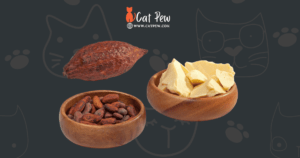
Cocoa butter, derived from cocoa beans, is a common ingredient found in various products like lotions, creams, and even some edible treats. While it is safe for humans to consume in moderation, cocoa butter can potentially pose risks to our feline companions. Cats are unable to metabolize certain substances found in cocoa butter, making it potentially dangerous for them to ingest. In this article, we will delve deeper into the potential dangers of cocoa butter for cats, focusing on the effects of theobromine on cats, symptoms of theobromine poisoning, and the risks associated with cats ingesting cocoa butter. Cat owners need to be aware of these potential dangers and take necessary precautions to ensure the well-being of their furry friends.
Theobromine And Its Effects On Cats
Theobromine is a naturally occurring compound found in cocoa beans and cocoa butter. While humans can handle theobromine without any major issues, cats lack a certain enzyme called theobromine methyltransferase, which is responsible for metabolizing theobromine. As a result, theobromine can build up in their system and lead to various health problems.
Symptoms Of Theobromine Poisoning In Cats
If a cat consumes cocoa butter or any cocoa-containing products, they may experience symptoms of theobromine poisoning. These symptoms can range from mild to severe, depending on the amount ingested and the cat’s sensitivity. Common symptoms of theobromine poisoning in cats may include:
- Vomiting
- Diarrhea
- Increased heart rate
- Restlessness or hyperactivity
- Tremors
- Seizures
If you notice any of these symptoms in your cat after suspected cocoa butter ingestion, it is crucial to seek veterinary attention immediately to prevent further complications.
Risks Associated With Cats Ingesting Cocoa Butter
Cats ingesting cocoa butter can face several risks that should not be taken lightly. The theobromine content in cocoa butter can potentially lead to theobromine poisoning, which can be life-threatening if not addressed promptly. Apart from theobromine poisoning, cocoa butter is high in fat content, which can lead to gastrointestinal issues in cats, such as pancreatitis or diarrhea. Additionally, some cocoa butter products may contain other ingredients that could be harmful to cats, like artificial sweeteners or essential oils. Therefore, it is crucial to keep cocoa butter and any cocoa-containing products securely stored away from your feline companions to prevent accidental ingestion.
In conclusion, while cocoa butter may be safe for humans, it can pose potential dangers to our curious and mischievous feline friends. Theobromine, along with its high-fat content and potentially added harmful ingredients, can lead to theobromine poisoning, gastrointestinal issues, and other negative health effects. Cat owners need to be aware of these risks and take proactive measures to keep cocoa butter out of their cats’ reach. By prioritizing their well-being and avoiding exposure to cocoa butter, we can ensure our beloved cats lead happy and healthy lives.
Signs Of Cocoa Butter Toxicity In Cats
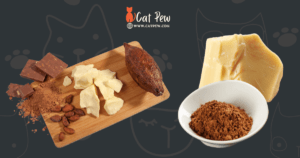
As cat owners, it is our responsibility to keep our furry friends safe from potentially harmful substances. While we may enjoy the rich aroma and moisturizing properties of cocoa butter, it is important to note that cocoa butter can be dangerous for cats if ingested. If you suspect your cat has come into contact with cocoa butter, it is crucial to be aware of the signs of cocoa butter toxicity in cats. Here are a few key indicators to watch out for:
Vomiting And Diarrhea
Vomiting and diarrhea are common symptoms of cocoa butter toxicity in cats. If your cat has consumed cocoa butter, they may experience gastrointestinal distress in the form of frequent vomiting and loose, watery stools. It is important to monitor your cat closely and seek veterinary attention if these symptoms persist.
Increased Heart Rate And Blood Pressure
Cocoa butter contains caffeine, which can have a stimulating effect on a cat’s cardiovascular system. As a result, cocoa butter toxicity can lead to an increased heart rate and blood pressure in cats. These changes can be alarming and may require immediate veterinary intervention. Keep an eye out for signs of rapid breathing or a noticeably racing heartbeat.
Hyperactivity Or Restlessness
Another sign of cocoa butter toxicity in cats is hyperactivity or restlessness. The caffeine content in cocoa butter can act as a stimulant, affecting a cat’s behavior and causing them to become excessively active or agitated. If you notice that your cat is displaying unusual levels of activity or restlessness, it is important to consider the possibility of cocoa butter ingestion and seek professional help.
If you observe any of these signs or suspect that your cat has ingested cocoa butter, prompt action is essential. Contact your veterinarian immediately for guidance and follow their recommendations for appropriate treatment. Remember, prevention is always the best approach when it comes to safeguarding our beloved feline companions from potential dangers. Keep cocoa butter and other potentially toxic substances securely out of your cat’s reach to ensure their well-being.
Steps To Take If Your Cat Ingests Cocoa Butter
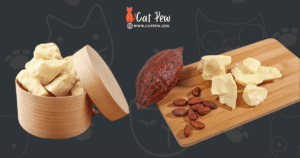
Steps to Take If Your Cat Ingests Cocoa Butter
Accidents happen, and it’s not uncommon for curious cats to get their paws on things they shouldn’t. If your feline friend has managed to ingest cocoa butter, you need to act quickly to ensure their safety. While cocoa butter is generally considered safe for humans, it can pose potential dangers to cats due to their different metabolism. Here are the essential steps to take if your cat ingests cocoa butter:
Contacting Your Veterinarian
1. Call your veterinarian immediately: The first and most crucial step is to contact your veterinarian. Explain the situation and provide all the necessary details, such as the quantity of cocoa butter ingested, the time of ingestion, and any visible symptoms your cat might be experiencing. Keep in mind that your vet is the best person to guide you on the next course of action.
Inducing Vomiting Under Veterinary Guidance
2. Do not induce vomiting without veterinary guidance: While inducing vomiting may be a common solution for certain poisonous substances, it is not recommended for cocoa butter ingestion in cats. Cocoa butter is a high-fat food compound, and inducing vomiting unsupervised can lead to additional complications. It’s critical to follow your veterinarian’s advice for the best course of action.
Monitoring Your Cat’s Vital Signs And Behavior
3. Observe your cat closely: After the initial contact with your veterinarian, closely monitor your cat’s vital signs and behavior. Look out for signs such as excessive salivation, vomiting, diarrhea, tremors, increased heart rate, or any other unusual behavior. If you notice any alarming symptoms, contact your vet immediately for further guidance.
4. Ensure your cat maintains proper hydration: Encourage your cat to drink water regularly to prevent dehydration. However, ensure that the water is fresh and clean to avoid any further stomach upset.
5. Restrict access to cocoa butter and other potentially harmful substances: While accidents can happen, it’s essential to create a safe environment for your cat. Ensure that cocoa butter and other potentially dangerous substances are securely stored out of your cat’s reach.
6. Follow your veterinarian’s instructions: Throughout the process, it’s crucial to adhere to your veterinarian’s guidance and instructions. They will be able to provide personalized advice based on your cat’s specific situation.
Remember, when it comes to the health and safety of your beloved feline companion, it’s always better to be safe than sorry. Take prompt action and consult your veterinarian to ensure your cat’s well-being.
Preventing Cocoa Butter Toxicity In Cats
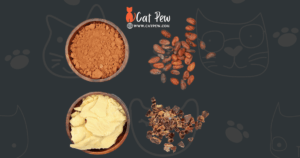
Cocoa butter can be dangerous to cats and may cause toxicity if ingested. It is important to prevent cats from accessing cocoa butter products to ensure their safety and well-being.
Keeping Cocoa Butter Products Out Of Reach
Cats are curious creatures by nature, and their inquisitive nature often leads them to investigate anything within their reach. It is crucial to keep cocoa butter products safely stored and out of your cat’s reach to prevent any potential poisoning incidents. Cocoa butter contains theobromine, a substance that can be toxic to cats. Therefore, it is essential to store cocoa butter products in closed cabinets or high shelves, ensuring they are completely inaccessible to your feline friend.
Alternatives To Cocoa Butter For Moisturizing Cats’ Skin
Cocoa butter is commonly used for its moisturizing properties. However, when it comes to cats, it is best to avoid using this particular ingredient. Luckily, there are alternative products that are safe and effective for moisturizing your cat’s skin. One popular option is shea butter, which is non-toxic to cats and provides similar moisturizing benefits. Additionally, you can also consider using specialized cat-friendly moisturizers available in pet stores, specifically formulated to cater to feline skincare needs. These alternatives will ensure your cat’s skin remains healthy and hydrated without exposing them to any potential risks.
Educating Family Members And Guests About The Dangers Of Cocoa Butter For Cats
Ensuring the safety of your cat goes beyond keeping cocoa butter products out of reach. It is equally important to educate your family members and guests about the dangers of cocoa butter for cats. Many people might not be aware of the potential hazards cocoa butter poses to feline health. By informing them about this, you can prevent accidental exposure or ingestion of cocoa butter by cats. Educating others about the toxicity of cocoa butter promotes a safe and cat-friendly environment for your feline companion.
Frequently Asked Questions Of Is Cocoa Butter Dangerous To Cats
Can I Use Cocoa Butter If I Have A Cat?
Yes, you can use cocoa butter if you have a cat. However, it’s important to keep in mind that cats may be sensitive to certain ingredients, so it’s best to consult with a veterinarian before using any products on your cat’s skin.
Is Cocoa Butter Toxic To Pets?
No, cocoa butter is not toxic to pets. It is safe for them to consume in moderate amounts.
Will A Tiny Bit Of Chocolate Hurt My Cat?
A tiny bit of chocolate can hurt your cat because it contains theobromine, which is toxic to them.
How Much Cocoa Powder Is Toxic To Cats?
Cats can become ill or even die from ingesting as little as one teaspoon of cocoa powder. It’s toxic due to the presence of theobromine. Avoid any amount of this substance to ensure the safety of your feline friend. Cocoa ingestion should be treated as an emergency.
Conclusion
While cocoa butter may seem harmless, it can be dangerous to cats. As a source of theobromine, it can lead to symptoms like vomiting, diarrhea, increased heart rate, and even seizure. As responsible pet owners, it’s crucial to prioritize the well-being of our feline companions and keep products containing cocoa butter out of their reach.
Ensuring their safety and health should always be our top priority.

Winston
I'm Winston, the author of this feline-focused (Catpew.com) blog . My love for cats goes back to my childhood, when I spent countless hours playing with my family's tabby, Mittens. This furry friend instilled in me a deep appreciation for the unique personalities, playful nature, and unconditional love that cats offer.

